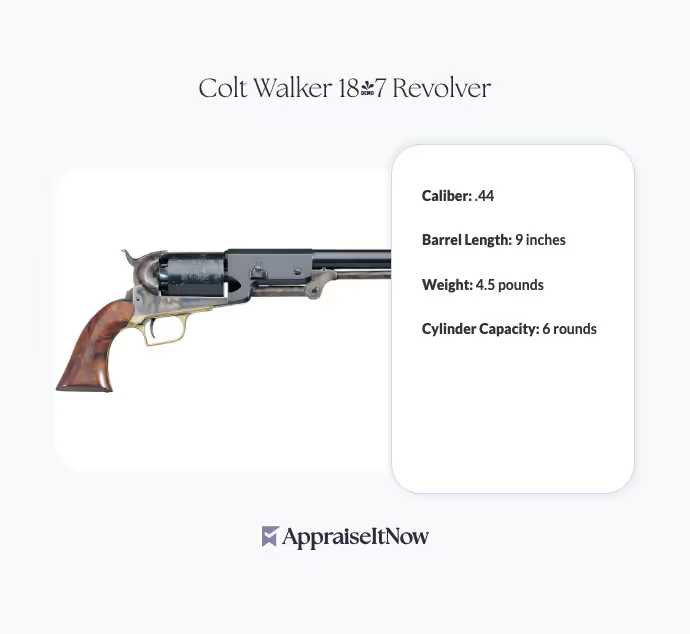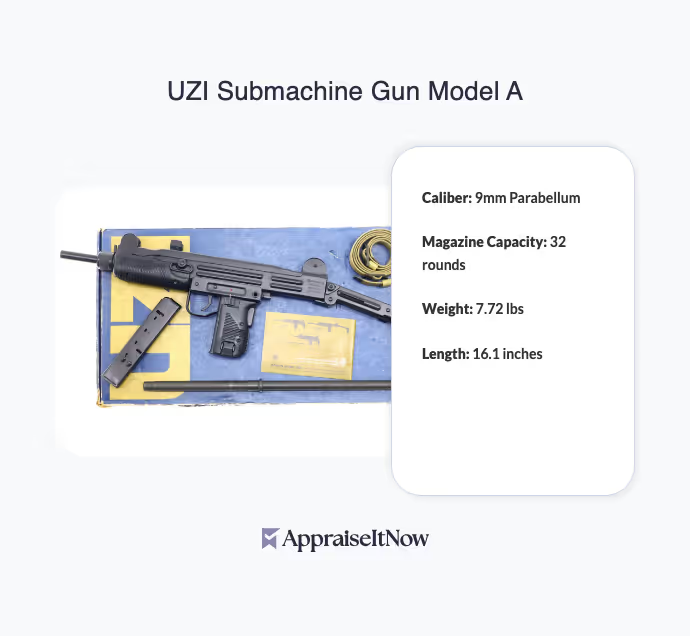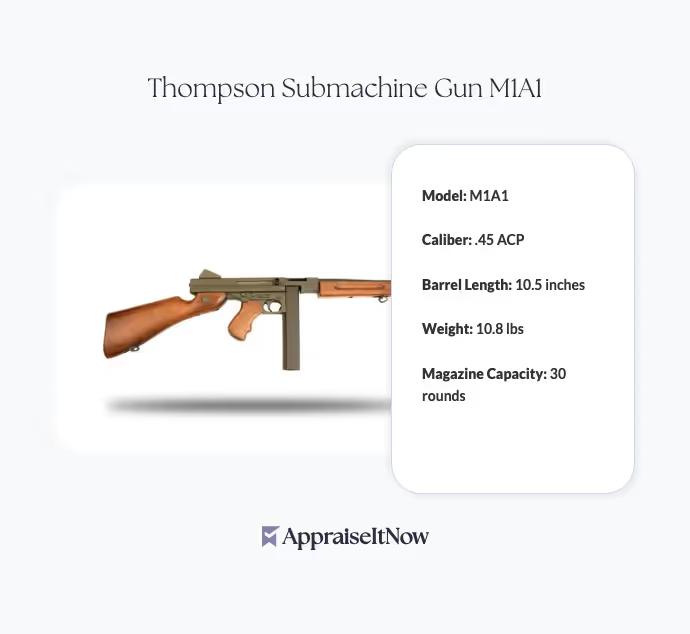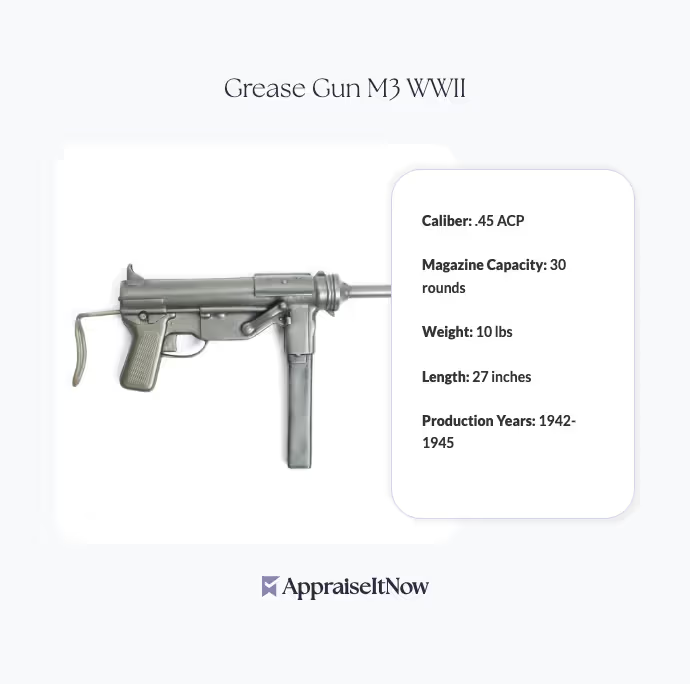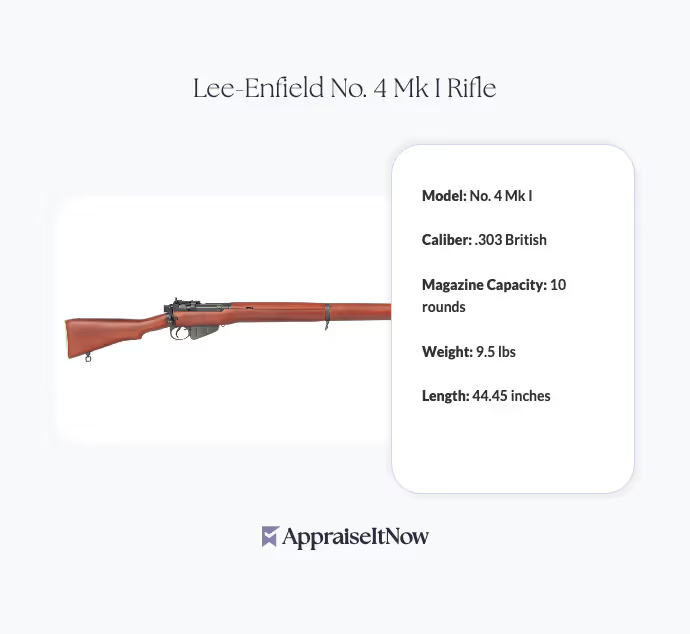<h1>How to Get Your Colt Walker 1847 Revolver Appraised</h1>
<p>The Colt Walker 1847 Revolver stands as one of the most iconic firearms in American history, commanding significant attention from collectors and enthusiasts alike. Whether you've inherited one, discovered it in an estate, or are considering adding one to your collection, understanding how to properly appraise this legendary revolver ensures you make informed decisions about its value and authenticity. With estimated values ranging from <strong>$10,000 to $15,000</strong>, getting a professional appraisal is essential for insurance, sale, or collection documentation purposes.</p>
<h2>Understanding Your Colt Walker's Historical Significance</h2>
<p>Designed by <strong>Samuel Colt</strong> and introduced in 1847, the Colt Walker represents a watershed moment in firearms development. This revolver was the most powerful handgun of its time, featuring a large .44 caliber round capable of delivering devastating stopping power—a critical advantage for Texas Rangers and frontier settlers facing hostile conditions. The weapon's rugged construction and exceptional reliability made it a trusted tool during America's expansion into the West, cementing its place in the annals of American frontier history.</p>
<p>Your Colt Walker's value stems directly from this historical prominence. As the first revolver to combine serious firepower with mechanical reliability, it earned the trust of some of America's most legendary figures, particularly the Texas Rangers who relied on it during the Mexican-American War. This provenance means every Colt Walker carries a piece of American history, and understanding its significance helps contextualize why <a href="/blog/antique-gun-appraisals-what-you-should-know">antique gun appraisals</a> are so crucial for proper valuation.</p>
<div class="callout tip"><p><strong>Historical Context</strong></p>
<p>A Colt Walker with documented Texas Ranger provenance or verified combat history can command premiums of 15-25% above standard market values.</p></div>
<h2>Key Specifications That Affect Appraisal Value</h2>
<p>When appraisers evaluate your Colt Walker 1847 Revolver, they examine specific technical features that directly influence market value. Understanding these specifications helps you prepare documentation for your appraisal and recognizes what makes your particular revolver potentially more or less valuable than comparable examples.</p>
<p>The .44 caliber represented exceptional power for its era, significantly outperforming contemporary revolvers and earning immediate respect among military and civilian users. Production quality varied across manufacturing runs, with early examples often showing superior craftsmanship compared to later-issued models. The revolver's distinctive appearance—featuring a long barrel, substantial frame, and loading lever—makes it instantly recognizable to even casual firearms enthusiasts.</p>
<p>Key specifications collectors focus on include matching serial numbers across all major components (barrel, frame, cylinder, and loading lever), original finish integrity, bore condition, and mechanical functionality. Each factor contributes to determining where your revolver falls within that <strong>$10,000 to $15,000</strong> valuation range. Professional appraisers specializing in <a href="/blog/what-to-look-for-when-appraising-an-antique-gun">antique firearms</a> understand these nuances and can accurately assess your specific example's worth.</p>
<h2>Determining Original Condition and Authenticity</h2>
<p>Your Colt Walker's condition dramatically affects its appraisal value, and establishing authenticity represents the first critical step in the valuation process. Many reproductions, reimports, and restored examples circulate in the collector market, making expert authentication essential before investment decisions occur.</p>
<p>Authentic Colt Walkers display specific markers that trained appraisers recognize. Original finishes—typically bright, blued, or casehardened steel—tell stories of the revolver's age and use. Wear patterns should follow logical progression based on handling and storage rather than appearing artificially aged. Markings should include proper Colt factory stamps, military acceptance marks, and serial number consistency across all components. When examining your revolver, observe the loading lever's pivot, the cylinder rotation's smoothness, and whether all numbered parts match the frame's serial number.</p>
<p>The question <em>How many Colt Walkers are left?</em> reflects collector concern about rarity. Historical records indicate that while thousands were produced for military service, relatively few have survived in recognizable condition. This scarcity, combined with strong demand, supports the healthy valuation range your example commands. Professional appraisers verify authenticity by comparing your revolver against documented specifications, factory records, and known examples housed in museum collections.</p>
<h2>Preparing Your Colt Walker for Professional Appraisal</h2>
<p>Before submitting your revolver for appraisal, take specific steps to ensure the process yields accurate, defensible valuations. Start by documenting your revolver's current condition through high-quality photography from multiple angles, capturing all markings, wear patterns, and any distinguishing features. Include close-up images of the frame, barrel markings, cylinder, and loading lever, as these details help appraisers conduct preliminary assessments.</p>
<p>Compile any documentation you possess—purchase receipts, previous appraisals, family provenance information, or historical research connecting your example to specific military units or notable owners. Even incomplete information helps establish authenticity and can add significant value if your Colt Walker has documented history. Avoid attempting cleaning, restoration, or any modifications before appraisal, as professional appraisers value original condition above all else. Attempting amateur restoration often decreases value substantially and can destroy evidence of authenticity that experts rely upon for proper valuation.</p>
<div class="callout note"><p><strong>Preparation Priority</strong></p>
<p>Original condition, even with age-related wear, almost always appraises higher than restored examples because authenticity commands premium pricing in the collector market.</p></div>
<h2>What Makes the Colt Walker a Collector's Item</h2>
<p>Understanding what elevates the Colt Walker from a historical curiosity to a highly valued collector's item helps you recognize your revolver's significance. The firearm's role in American westward expansion, its mechanical innovations, and its association with legendary frontier figures all contribute to strong collector demand. Museums, serious collectors, and historical institutions actively seek well-preserved Colt Walkers to complete collections or preserve important historical examples.</p>
<p>The revolver's distinctive design—which influenced Colt's subsequent highly successful Model 1860—means collectors interested in firearms evolution specifically target Colt Walkers as foundational pieces. Additionally, as one of the most historically significant American-made firearms, the Colt Walker carries cultural weight beyond typical gun collecting interests. This broad appeal helps maintain steady demand and value appreciation, distinguishing it from more specialized military firearms that appeal only to narrow collector segments.</p>
<p>When considering <a href="/types/memorabilia-and-collectibles">memorabilia and collectibles</a> from an investment perspective, the Colt Walker demonstrates remarkable stability. Unlike some antique firearms that experience significant price fluctuations based on regulatory changes or temporary market conditions, the Colt Walker's historical importance and limited supply create relatively consistent valuation floors.</p>
<h2>Selecting the Right Appraiser for Your Revolver</h2>
<p>Finding a qualified professional who understands the nuances of 19th-century American firearms is crucial for obtaining accurate appraisals. Not all <a href="/blog/picking-the-right-antique-gun-appraisal-expert-for-your-needs">antique gun appraisers</a> possess equal expertise—you want someone with specific knowledge of Colt revolvers, period-correct manufacturing variations, and current market conditions for historical firearms.</p>
<p>Look for appraisers who hold credentials from recognized organizations like the <strong>American Society of Appraisers (ASA)</strong>, <strong>American Association of Independent Appraisers (AAIA)</strong>, or <strong>International Society of Appraisers (ISA)</strong>. These certifications indicate formal training, adherence to professional standards, and commitment to USPAP (Uniform Standards of Professional Appraisal Practice) compliance. Experience matters tremendously—an appraiser who has specifically valued multiple Colt Walkers understands the market dynamics, knows which variations command premiums, and can provide detailed comparative analysis supporting their conclusions.</p>
<div class="callout tip"><p><strong>Appraiser Selection</strong></p>
<p>Ask potential appraisers about their Colt Walker experience specifically. Request references from previous clients and examples of detailed appraisal reports they've prepared for similar firearms.</p></div>
<p>Professional appraisal services like <strong>AppraiseItNow</strong> connect you with certified experts across the United States who specialize in antique firearms and understand the legal requirements for <a href="/blog/how-to-choose-a-licensed-professional-to-perform-your-antique-gun-appraisal">NFA firearms documentation</a>. These platforms ensure you receive USPAP-compliant reports acceptable to insurance companies, auction houses, attorneys, and financial institutions.</p>
<h2>The Appraisal Valuation Process</h2>
<p>When your appraiser receives your Colt Walker, they follow a systematic evaluation process grounded in professional standards. They'll examine the revolver thoroughly, measuring key dimensions, testing mechanical function, assessing finish condition, and documenting all markings visible on the frame, barrel, and cylinder. This hands-on evaluation reveals details that photographs alone cannot capture.</p>
<p>Your appraiser will compare your specific example against recently sold comparable firearms, considering variables like condition, documented provenance, and market demand. They analyze sales data from reputable auction houses, private sales between collectors, and current dealer offerings to establish fair market value. This comparative analysis forms the foundation of accurate appraisals, distinguishing professional valuations from casual estimates.</p>
<p>The resulting appraisal report should include detailed photographs, comprehensive condition assessment, historical context explaining your Colt Walker's significance, comparative sales analysis, and a clearly stated fair market value opinion. This documentation becomes essential for insurance claims, estate proceedings, sale negotiations, or legal disputes. A properly prepared appraisal provides defensible professional opinion supported by market research and physical examination—far more valuable than casual estimates or online price comparisons.</p>
<h2>Why Serial Number Verification Matters</h2>
<p>One question collectors frequently ask—<em>Can you look up gun value by serial number?</em>—reflects misunderstanding about how firearms appraisals function. While serial numbers don't directly determine value, they're instrumental in verifying authenticity and establishing production timeline. Matching serial numbers across all major components confirms the revolver is an original, unassembled example rather than a composite gun assembled from parts of multiple firearms.</p>
<p>Your appraiser will research your Colt Walker's serial number against factory records where available, cross-referencing it against known production runs, military acquisitions, and documented examples in museum or private collections. This process can sometimes identify your specific revolver's original issuance, unit assignment, or notable previous owners—information that substantially increases value if it connects your example to historically significant figures or events.</p>
<h2>Insurance and Documentation Needs</h2>
<p>Obtaining a professional appraisal becomes particularly important if you're insuring your Colt Walker through a homeowner's or collector's policy. Standard homeowner's insurance often provides inadequate coverage for high-value collectibles, and proving loss becomes extremely difficult without documented appraisals completed before the loss occurs. Insurers typically require USPAP-compliant appraisals from credentialed professionals to justify coverage limits on items appraised above $1,000.</p>
<p>An appraisal provides documented proof of value at a specific point in time, creating the foundation for insurance claims and settlement negotiations. Additionally, if you're planning to sell through auction houses, dealer networks, or private sales, having an independent professional appraisal strengthens your negotiating position and builds buyer confidence. Serious collectors and institutions purchasing significant firearms almost universally request or require current professional appraisals before committing to purchase.</p>
<h2>Understanding Current Market Dynamics</h2>
<p>The collector firearms market has demonstrated remarkable resilience and appreciation over recent decades. While market conditions certainly fluctuate, the Colt Walker's position as perhaps the most historically significant American revolver ensures consistent demand from museums, serious collectors, and institutions dedicated to preserving American history. Current market estimates place quality examples in the <strong>$10,000 to $15,000</strong> range, though exceptional specimens with verified provenance or superior condition command substantially higher values.</p>
<p>Several factors support the Colt Walker's market strength. Supply remains relatively fixed—no new production occurs, and each firearm lost to time decreases availability. Demand continues expanding as wealth creation produces new collectors seeking premier historical pieces, while established collectors actively upgrade their holdings with better examples. This fundamental supply-demand dynamic helps explain why professional appraisals typically indicate strong valuations for well-preserved examples.</p>
<p>The question <em>What is the most sought after Colt revolver?</em> often generates debate, but the Colt Walker consistently ranks among the absolute top tier due to its historical significance and mechanical innovation. This positioning ensures your appraisal likely reflects healthy market appreciation from the time of acquisition, particularly if you've held your example for several years.</p>
<div class="callout note"><p><strong>Market Insight</strong></p>
<p>Colt Walker values have historically outpaced general economic inflation, suggesting the firearm functions as both historical artifact and sound financial asset.</p></div>
<h2>Final Considerations for Your Appraisal</h2>
<p>Your Colt Walker 1847 Revolver represents far more than a functional firearm—it embodies American frontier history, mechanical ingenuity, and cultural significance. Getting a professional appraisal ensures you understand your revolver's value accurately, whether you're buying, selling, insuring, or simply documenting your collection. The investment in a certified appraisal pays dividends through increased confidence, defensible valuations, and documentation that satisfies professional, legal, and financial institutional requirements.</p>
<div class="callout note"><p><strong>Key Takeaway</strong></p>
<p>A certified professional appraisal of your Colt Walker 1847 Revolver provides accurate valuation documentation, establishes authenticity, and delivers peace of mind knowing your historical treasure is properly understood and valued in today's market.</p></div>
